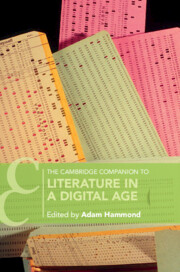Book contents
- The Cambridge Companion to Literature in a Digital Age
- The Cambridge Companion to Literature in a Digital Age
- Copyright page
- Contents
- Figures
- Contributors
- Chronology
- Introduction
- Chapter 1 Literary Data
- Chapter 2 Literary Change
- Chapter 3 The Canon
- Chapter 4 Voice and Performance
- Chapter 5 The Archive
- Chapter 6 Editions
- Chapter 7 Materiality
- Chapter 8 The Literary Marketplace
- Chapter 9 Fanfiction, Digital Platforms, and Social Reading
- Chapter 10 Narrative and Interactivity
- Chapter 11 Generated Literature
- Chapter 12 Literary Gaming
- Chapter 13 The Printed Book in the Digital Age
- Chapter 14 Literature’s Audioptic Platform
- Chapter 15 Critique
- Index
- Cambridge Companions To Literature
Chapter 3 - The Canon
Published online by Cambridge University Press: 29 November 2024
- The Cambridge Companion to Literature in a Digital Age
- The Cambridge Companion to Literature in a Digital Age
- Copyright page
- Contents
- Figures
- Contributors
- Chronology
- Introduction
- Chapter 1 Literary Data
- Chapter 2 Literary Change
- Chapter 3 The Canon
- Chapter 4 Voice and Performance
- Chapter 5 The Archive
- Chapter 6 Editions
- Chapter 7 Materiality
- Chapter 8 The Literary Marketplace
- Chapter 9 Fanfiction, Digital Platforms, and Social Reading
- Chapter 10 Narrative and Interactivity
- Chapter 11 Generated Literature
- Chapter 12 Literary Gaming
- Chapter 13 The Printed Book in the Digital Age
- Chapter 14 Literature’s Audioptic Platform
- Chapter 15 Critique
- Index
- Cambridge Companions To Literature
Summary
In its early days, the methods and theories of the digital humanities promised to reform our understanding of the canon, or, given a comprehensive archive of literature and the tools for analyzing all of it, even abolish it all together. Although these earlier utopian hopes for digital archives and computational text analysis have proven to be ill founded, the points of contact between the canon and the digital humanities have had a profound effect on both. From studies that test the formal properties of canonical literature to those that seek to explore the depths of newly available archives, the canon has remained an object of significant interest for scholars working in these burgeoning fields. This chapter explores the fraught relationship between the canon and computational analysis, arguing that, in the hands of cultural analytics, the canon has transformed from a prescriptive to a descriptive technology of literary study.
Keywords
- Type
- Chapter
- Information
- The Cambridge Companion to Literature in a Digital Age , pp. 47 - 65Publisher: Cambridge University PressPrint publication year: 2024

